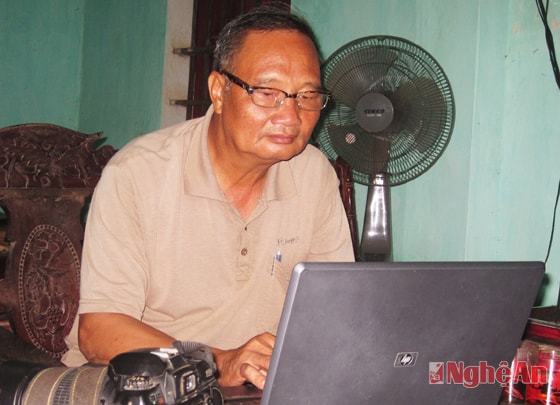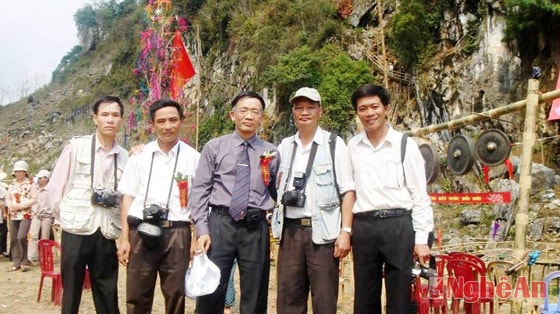Keeper of Thai culture
(Baonghean) - Speaking of Mr. Luong Viet Thoai, Con village, Chau Quang commune (Quy Hop), everyone in the Thai ethnic group in the village and commune knows him because of his profound articles; good novels, reflecting the real and vivid life and culture of the Thai ethnic group. His works have contributed valuable materials in teaching the traditional culture of the Thai ethnic group to today's and future generations.
 |
| Mr. Luong Viet Thoai. |
Pouring a cup of sweet-scented Sophora japonica tea, he said: “Have a cup of tea to warm your stomach.” His enthusiasm and friendly way of speaking were enough to warm my heart. I sipped my tea, looked around, the small 3-room house, the furniture was arranged neatly and tidily. Both sons were married, working far away, leaving only the old couple in the house. He was 60 years old, retired for a long time, but the military style seemed to be ingrained in his blood, clearly shown in his voice and daily activities.
At the age of 16, Thai ethnic boy Luong Viet Thoai left the mountains, forests and villages to follow the sacred call of the Fatherland. After training at Group 22 - Military Region 4 for a while, Luong Viet Thoai was assigned to the Tri Thien Military Region to operate in the Hue Special Forces Group, stationed at C2 - Huong Tra. After the liberation of Hue City (March 26, 1975), Luong Viet Thoai attended a foreign language class in Lang Son and then studied History at Hanoi University. After graduating, while working as a collaborator for the Army Newspaper, Luong Viet Thoai was sent to study journalism at the Political - Military Academy of the Ministry of National Defense. After finishing his studies, he was assigned to work at the Navy Command in Nha Trang, drifting day and night with the waves. Throughout his time in the army, from when he was a rookie to when he became a political officer, participating in many major campaigns, Luong Viet Thoai still kept the habit of writing in his spare time. The soldier’s feelings of sadness, joy, longing, and even his worries and thoughts are conveyed through each article. His poetry and many articles are appearing in the Army, Navy, and Women’s newspapers more and more. That passion seems to have become a natural need and a natural destiny.
He often humorously explained to his friends and colleagues about the pen name Thai Tam, which means “to the ear”, that what he wrote must be constructive, suggestive, educational… But the deeper reason for this pen name is a memory of his bloody Tri Thien battlefield with a reporter from Thua Thien Hue. For more than 40 years, the image of that journalist-martyr still makes him restless. At that time, he was working in the Hue Special Forces Group, assigned to guide a reporter with the pen name Thai Tam to the field in the suburbs. The road was long, the basket of cassava on his back was sagging, Mr. Thoai stopped to fix it and told the journalist to keep going and he would catch up. After about ten minutes, a series of loud gunshots rang out, the sky and earth seemed to darken. That companion had passed away forever, he suppressed his pain and continued his mission. Until now, he still blames himself: "If only he hadn't told him to go first", even though he understands better than anyone that the boundary between life and death in war is very fragile. Since then, Mr. Thoai's spiritual children have all taken the pen name Thai Tam as a deep gratitude. Many times, Mr. Thoai has returned to the old battlefield, following the little information he has collected to find the family of that journalist - martyr, but until now it is still unclear. He read me the poem "Crying for Thai Tam" and suddenly lost his voice, his eyes blinked as if trying to hide his emotions...
 |
| Luong Viet Thoai (2nd from right) at Muong Ham Festival. |
Returning to his hometown, he actively participated in grassroots work, serving as the Chief of Con village from 1995 to 2000. This was also the time when Nghe Tinh Non-ferrous Metal Company came to set up shop and started exploiting minerals. Rumor had it that wherever you dig in Quy Hop, you can find tin. So locals and people from all over flocked to cut down trees and dig up the forest. The forest in his hometown of Con village was torn apart by loggers, many ancient trees were cut down. Mr. Thoai felt like he was sitting on a pile of fire, helpless. He suddenly thought of writing a newspaper to call on the local government to intervene. His article “Tears in Con village forest” became an alarm bell for the authorities to quickly intervene to save the forest. It was also the first work he sent to Nghe An newspaper. Since then, the pen name Thai Tam has become familiar to readers because of its topical issues, presented simply, with tight and sharp arguments. Since then, he has been actively writing articles and sending them to many places. Not only is he a journalistic collaborator, Thai Tam is also a member of the Nghe An Province Literature and Arts Association, a member of the Nghe An Photography and Journalism Club, and a member of the Vietnam Ethnic Minorities Literature and Arts Association. He writes poetry, stories, articles, and researches folklore... in every field, he leaves his own mark.
He considers himself lucky, lucky to be born and raised in the cradle of Thai culture with strong identity, lucky to be well-trained in folk culture by dedicated teachers at the university. Therefore, in the process of research, he has both a macro view of folk culture and a grasp of the micro in each local custom. He is passionate about researching the folk culture of the Thai people like a child tirelessly returning to his ancestors and roots to respect, cherish and preserve. The streams and creeks throughout the nine villages and ten Muongs bear his footprints. The villagers respect him like a family member. The uniqueness in traditional culture, the wild and majestic natural beauty, or the serenity of the villages with stilt houses, the open-mindedness of the villagers... seem to invite the artist's soul in him, making him forget all the hardships and difficulties of the long and steep road.
Traveling a lot, meeting a lot, but for more than ten years, the image of a Thai woman teaching by the stream still left him with many emotions. That time, when he went to Chau Thai commune to report on the tree planting movement, on the way back, he saw some children picking horse-eared flowers - a typical flower of the mountainous region here, small, yellow flowers. He stopped the car to ask and the children told him that they were picking flowers to give to the teacher. He was surprised, because in the middle of this dense forest, there was no school, why was there a teacher? Stopping the car on the side of the road, he followed the children to meet the teacher. A simple classroom was precariously located by the stream, the wooden board made of a tree trunk made him feel sad. It was known that the "special teacher" followed her husband to the fields, seeing the children not being able to go to school, she volunteered to build a hut to teach them. In the 90s of the last century, few Thai women knew how to read and write, but this woman boldly opened a class to teach, leaving him with many thoughts. As much as he loved the children, he was equally grateful for the woman’s heart. He decided to write an article about the portrait of that “special teacher” with the title “Hoa nhac ngua”…
His homeland is changing day by day, he is very happy but also very worried. Seeing the young generation growing up, not many are interested in traditional culture, some do not even know how to speak Thai, the folk songs and dances of the Thai people are gradually fading away, he is sad. He took out the historical novel "Tieng Shout Tong Loi" from the bookshelf, signed it for me and told me: "Do not use the culture of the Kinh people to explain the customs and practices of ethnic minorities. If you want to write more about the culture of ethnic minorities in the Western region of Nghe An, including the Thai people, please refer to this novel". His "Tieng Shout Tong Loi" was accepted by the Nghe An Province Literature and Arts Association and achieved grade A (October 2010). Historical documents that seem dry are transformed by his pen in a soft and gentle way. The customs, habits, and daily activities of the people here are clearly shown, helping readers understand more about the traditional culture of the Thai people. Holding the thick book in my hand, I understood how much effort and passion of an artist, a researcher and above all, of a son of the Thai ethnic group he had put into this.
Outside, the rain continued to fall, and it was cold. But Mr. Luong Viet Thoai’s sincerity made me feel warm. Suddenly, I thought that Mr. Thoai’s passion and enthusiasm were the fire that lit up the beauty of traditional culture in the face of the hustle and bustle of modern life.
Nguyen Le
